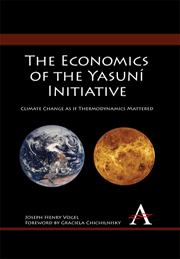Book contents
- Frontmatter
- Contents
- Prologue
- Foreword
- Introduction
- Acknowledgements
- Abbreviations and Acronyms
- The Economics of the Yasuní Initiative
- Chapter 1 Thermodynamics
- Chapter 2 The Tragedy of the Commons
- Chapter 3 The Willful Ignorance of Realpolitik
- Chapter 4 The General Theory of Second Best
- Chapter 5 Through the Bottleneck of a Cowboy Economy
- Conclusions
- Appendix: Annotated YouTube Filmography
- Ordering
- Notes
- Index
Chapter 4 - The General Theory of Second Best
A Rigorous Justification for an Intuitively Just Proposal
Published online by Cambridge University Press: 05 March 2012
- Frontmatter
- Contents
- Prologue
- Foreword
- Introduction
- Acknowledgements
- Abbreviations and Acronyms
- The Economics of the Yasuní Initiative
- Chapter 1 Thermodynamics
- Chapter 2 The Tragedy of the Commons
- Chapter 3 The Willful Ignorance of Realpolitik
- Chapter 4 The General Theory of Second Best
- Chapter 5 Through the Bottleneck of a Cowboy Economy
- Conclusions
- Appendix: Annotated YouTube Filmography
- Ordering
- Notes
- Index
Summary
Robert W. Fogel won the 1993 Nobel Memorial Prize in Economics “for having renewed research in economic history by applying economic theory and quantitative methods in order to explain economic and institutional change.” Clio was the muse of history and Fogel applied the new “cliometrics” to accounting records of slave transactions. In 1974, he and Stanley Engerman published Time on the Cross: The Economics of the American Negro Slavery. The analysis refuted the popular narrative that ran something like this
The slave system was economically moribund;
Union soldiers, fired up by abolitionist presses, died in vain;
Slaves would have soon been freed anyway;
The rising tide of sentiment pro-abolition in the North had little to do with secession of the Confederate States in the South.
Although exposing mythologies is healthy for any democracy, such analysis can also be misconstrued. For example, Fogel and Engerman note that “…the evidence that is beginning to accumulate suggests that the attack on the material conditions of the life of blacks after the Civil War was not only more ferocious, but in certain respect, more cruel than that which preceded it.” Was slave-life better than freedom? The question is loaded and invites an affirmative response which is both facile and repugnant. A holistic response is the stuff of the general theory of second best. “The attack on the material conditions of life after the Civil War” means that the government failed to intervene in a way that would put the freed slaves on a path of material well-being.
- Type
- Chapter
- Information
- The Economics of the Yasuní InitiativeClimate Change as if Thermodynamics Mattered, pp. 41 - 52Publisher: Anthem PressPrint publication year: 2010
- 1
- Cited by



